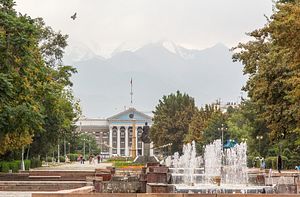The Central Asian republic of Kyrgyzstan was in the spotlight once again after the October 24 ruling of the International Court of Arbitration in Paris, which awarded Latvian banker and businessmen Valery Belokon $16.5 million in an arbitration case against the Kyrgyz Republic. Belokon is a highly controversial figure in Kyrgyzstan, where several years ago he owned a bank that became the subject of money laundering allegations tied to the ousting of the Bakiyev regime in 2010. This is the third international case lost by the Kyrgyz government in recent months. Previously, two foreign companies won their cases in Ontario courts, where in one particular instance Canadian mining company Stans Energy obtained a court order obliging the Kyrgyz authorities to pay $118 million in damages and losses, over a mining license that was revoked on murky grounds according to Stans Energy CEO Robert Mackay.
The Kyrgyz Republic’s losing streak in the international courts continued when the Turkish company Sistem Muhendislik won its compensation claim against the Kyrgyz government in the Washington-based International Center for the Settlement of Investment Disputes. After winning, Sistem Muhendislik claimed $11 million in compensation from an uncooperative Kyrgyzstan, which resulted in an Ontario Court of Appeal ruling that the Kyrgyz government is now complying with. As international court bills are piling up, the Central Asian state has found itself in a difficult position over its latest negotiations concerning the Kumtor gold mine restructuring deal with Canada’s Centerra Gold Inc. Centerra itself is embroiled in an ongoing domestic scandal over corruption allegations with former Kyrgyz government officials and public environmental disputes with international and Bishkek-based NGOs. The uniqueness of the international arbitration cases against Kyrgyzstan highlight its vulnerability abroad and the government’s inability to manage complex international arbitration proceedings.
However, these are not surprising developments after years of domestic disturbances and a massive brain drain out of Kyrgyzstan in the last two decades. Combined with the corruption and incompetence of the previous and current Kyrgyz governments, the republic’s substantial legal troubles are the consequence of mismanaged domestic policies. Despite, the country’s relatively positive record on human rights and democracy in the region, Kyrgyzstan remains a fragile state that was on the brink of collapse in 2010 after a violent political disruption in Bishkek.
Many observers believe that outside superpowers should prop up this small nation’s institutions rather than watch it descend in chaps, setting unwanted precedents in the region. That will certainly be one possible outcome if Kyrgyzstan continues its divisive approach to its domestic affairs, which have been shaped by clan-based politics.
Ryskeldi Satke is a contributing writer with research institutions and news organizations in Central Asia, Turkey and the U.S. Contact e-mail: rsatke at gmail.com.
































